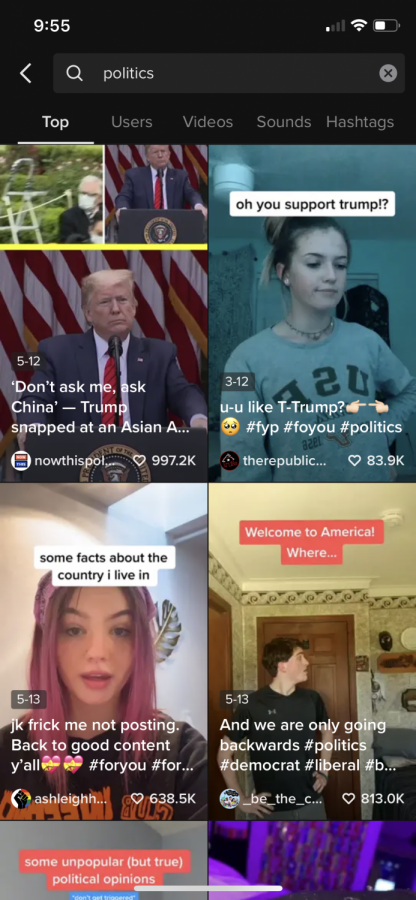Politics, Toxicity, and TikTok
As the presence of politics on TikTok continues to grow, so does the divide between young liberals and conservatives.
Discussing politics is a popular trend on TikTok, and some of the most attention-grabbing topics include President Trump and the current state of our country. Videos addressing such controversial issues gain thousands of likes and views.
Where do you get your daily dose of political news or debate? Your answer to this question might have been a newspaper like The New York Times or a news channel like CNN — TikTok is probably not a platform that has ever crossed your mind. After all, TikTok is just for dancing and comedy videos…right?
The last few years have seen an increase in people who get their news largely from social media. About 55% of adults turn to platforms like Facebook or Instagram for the news, according to the Pew Research Center. Still, a video-sharing platform like TikTok seems like an unlikely candidate as a steady news source. With a mainly teenage audience and a reputation for producing many of today’s most prevalent teen influencers, it is hard to imagine this app as political or informative.
However, a new generation of users are transforming the face of TikTok through their fervent political activism and stirring up controversy with the polarizing division between liberals and conservatives. Many creators devote their channels to discussing political issues from their respective parties or choose to spread awareness about current events. One such creator, Mia Brier, or @mieyuhh on TikTok, has amassed a following of over 130,000 people within the span of just a few months. With her articulate explanations, clever responses to bigoted comments, and a tinge of humor, she speaks out about “the racism black people face everyday in America.” Mia said, “The pros about creating political content is educating people that don’t learn about the stuff I talk about.”
Mia’s efforts to educate viewers, along with the efforts of many other political content creators, are undoubtedly successful, as many users actively consume political content to inform themselves. “I chose to watch political videos on TikTok because I liked the way that people explained delicate concepts in a way that a wider audience could understand,” said Stacy Yoon, a rising junior from Georgia. For others, watching the disagreement between political sides is simply a form of entertainment. Kimora Bedeau, a rising senior from Long Island, said, “I really like watching it just to laugh. I am biased towards liberals, and I find them to be funny, and some of the conservatives on TikTok are really biased to the point that it’s hilarious to me.”
These short political videos, which inform the audience in a variety of creative ways, ranging from directly responding to a comment to adding text over a video of themselves doing a popular dance trend, receive thousands of views and comments. This is reasonable that they do so, as politics is always highly controversial amongst a wide audience.
The comment sections under these videos are, more often than not, filled with users from opposing political parties arguing over the information given in a video. The great rift between liberals and conservatives in real life manifests on this app. “The increasing lack of common ground between Democrats and Republicans on TikTok kind of scares me,” Yoon said. “It’s really rare to even see people of differing political parties replying to each other’s ideas respectfully, which is an indicator of the current volatile bipartisan political climate in America.”
With an allegiance to one’s partisan beliefs comes consistent disagreement between parties, as Yoon mentioned, and this results in a toxic online climate that creates further polarization between liberals and conservatives. What should have been a disciplined discussion between the leftists and rightists of TikTok often leads to unnecessary criticism and hatred of the opposite party. “The lack of respect with which a lot of users react to the experiences and views of political content creators or the lack of respect shown by content creators themselves isn’t conducive to actual productive conversation or debate about important political issues; it just teaches people to react to people with different views than theirs with disgust and rude behavior,” Yoon said.
Isn’t TikTok just a kids app? With a permeating toxicity that drives the bipartisan split, why even bother bringing politics onto this platform? Just like the disagreement between political parties, there is disagreement on whether politics belongs on TikTok. “The app provides a platform for people to educate those in the younger age range, which hopefully allows for better informed citizens later on,” Yoon said. But taking into consideration the negativity that sometimes comes with discussing controversial topics on this platform, Bedeau thinks otherwise. “It’s not the best place for politics, especially with our generation; people could be doxxed or cyberbullied for their opinions,” she said.
TikTok, like every other social media platform, has its pros and cons. It can offer information and entertainment to those who seek it, but with the users’ ability to freely express themselves and hide behind an anonymous profile, it also harbors a toxic online culture of cyberbullying. Bringing politics to the virtual table — in this case, the ‘For You’ page — will inevitably spark tension between political parties. But despite the hostility between the right and left, the existence of politics on TikTok, as well as other social media platforms, serves as a valuable educational opportunity for this generation of teenagers.
Just like the disagreement between political parties, there is disagreement on whether politics belongs on TikTok.
Byul Sak is a Staff Reporter for ‘The Science Survey’ and Caption Editor for the ‘Observatory.’ She is passionate about reporting on politics,...

